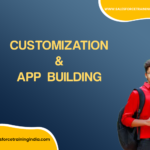Question
I’m learning Lightning Web Components (LWC) and followed a tutorial where they easily dragged a custom LWC component onto the Lightning App Builder canvas. However, in my org, I can see the component in the builder, but I’m unable to drag it to the canvas. This also affects standard components.
I’ve verified the .js-meta.xml configuration, confirmed the component is deployed, and even tried clearing my cache and using incognito mode. Any suggestions on why this might be happening or how to fix it?
Answer
It seems that there might be a couple of reasons why you’re unable to drag the components into the Lightning App Builder canvas. Here are a few possibilities and suggestions to resolve the issue:
1. Missing masterLabel Tag:
One potential cause could be the absence of the masterLabel tag in your component’s metadata file. This label is typically required to make the component available in the App Builder’s palette. Although it’s not strictly required for the component to function, missing it might cause issues with its availability in the builder.
Try adding the masterLabel tag like this:
<?xml version="1.0" encoding="UTF-8"?>
<LightningComponentBundle xmlns="http://soap.sforce.com/2006/04/metadata" fqn="MyComponent">
<apiVersion>58.0</apiVersion>
<isExposed>true</isExposed>
<masterLabel>MyComponent</masterLabel> <!-- Add this line -->
<targets>
<target>lightning__RecordPage</target>
<target>lightning__AppPage</target>
<target>lightning__HomePage</target>
</targets>
</LightningComponentBundle>After making this change, redeploy the component and check if it’s now draggable in the Lightning App Builder.
This XML code defines the metadata for a Lightning Web Component (LWC) in Salesforce.
The <LightningComponentBundle> element is the root element and specifies the component’s name through the fqn (Fully Qualified Name) attribute, which in this case is “MyComponent.”
The <apiVersion> tag specifies the API version of Salesforce to which this component is compatible—in this case, version 58.0.
The <isExposed> tag is set to true, meaning the component will be available for use in the Salesforce App Builder, allowing it to be added to pages like record, app, or home pages.
The <masterLabel> tag is a new addition, specifying a label for the component that will be displayed in the Lightning App Builder, which helps identify the component when dragging it onto the canvas.
The <targets> section defines the specific Salesforce page types where this component can be used.
In this case, the component is available for record pages (lightning__RecordPage), app pages (lightning__AppPage), and home pages (lightning__HomePage).
2. Check If the Component Is Properly Exposed:
Ensure that the isExposed tag is set to true and that the component targets the correct page types. You’ve already verified this part, but double-check to make sure the targets match what you’re trying to achieve. If your component is intended for record pages, app pages, or home pages, the targets should reflect this correctly.
3. Component Visibility Settings:
Sometimes the visibility settings or permissions related to the component can affect its usability. If you’re working in a managed package, make sure the component is not restricted to certain profiles or users. If it’s a custom component, ensure that the correct permissions are granted to users in your org.
4. Salesforce Org Configuration or Bugs:
If you’ve tried everything above and the issue persists, it could be an issue related to the Salesforce org configuration or a temporary bug. You might want to reach out to Salesforce support to investigate further.
After these changes, try dragging the component again. Hopefully, the issue will be resolved!If you’ve tried everything above and the issue persists, it could be an issue related to the Salesforce org configuration or a temporary bug. You might want to reach out to Salesforce support to investigate further.
After these changes, try dragging the component again. Hopefully, the issue will be resolved!
Kick Start Your Journey with Real-Time Project-Based Salesforce Learning
Our Salesforce Course is designed to offer a complete understanding of the Salesforce platform, providing you with the necessary skills to excel in the CRM industry. The program covers essential modules such as Salesforce Admin, Developer, and AI, combining theoretical knowledge with practical experience. Through real-world projects and assignments, you’ll develop the expertise needed to solve complex business challenges using Salesforce solutions. Our expert instructors ensure you gain both technical skills and valuable industry insights to succeed in the Salesforce environment.
Along with technical expertise, our Salesforce training in Chennai offers personalized mentoring, certification preparation, and interview coaching to improve your career prospects. You’ll have access to comprehensive study resources, practical project experience, and continuous support throughout your learning journey. By the time you complete the course, you’ll be well-equipped for certification exams and capable of applying your problem-solving skills in real-world scenarios. Begin your Salesforce career with us and unlock limitless career opportunities. Enroll for a Free Demo today!










Leave a Reply
You must be logged in to post a comment.